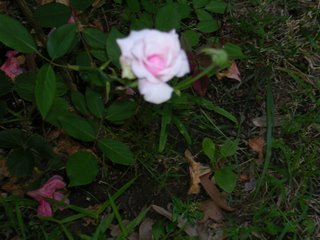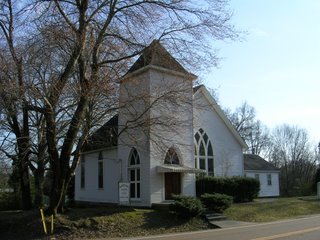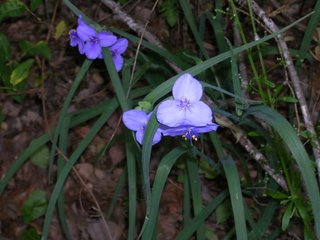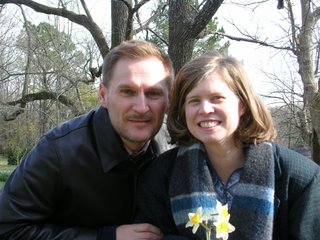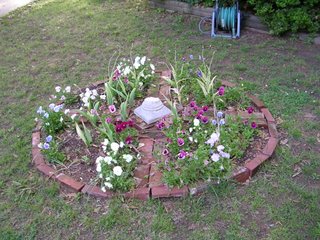 This is the flowerbed in our front yard. It's made of old bricks from our neighbor's dismantled chimney (plus two from Grandmother's yard.) That's why it looks like it's been there a while.
This is the flowerbed in our front yard. It's made of old bricks from our neighbor's dismantled chimney (plus two from Grandmother's yard.) That's why it looks like it's been there a while.But it has actually been there less than a year. I don't remember exactly when we got out there and brought it into being, but it wasn't too many months ago. What I do remember is that the bricks sat in a stack by the side of our house for many months before they finally turned into this flowerbed.
And that's where Docetism comes in.
What? You mean you don't see the connection?
Then let me explain.
Tonight I've been reading from C. FitzSimons Allison's The Cruelty of Heresy. Allison gives a very understandable presentation of the major heresies that have developed over time among Christians. And his main point is that every heresy is cruel in some way, because in trying to make truth somehow more palatable, or righteousness more attainable, people end up denying some important truth about righteousness, or about love, or about God. And those denials, those distortions, are ultimately cruel because they make relationship with God not possible, or at best very distorted.
So, Docetism is (very generally--if you want to know more, get the book) a belief based on the rejection of Christ's suffering. If he was divine, he couldn't have truly suffered. So, he must not have been truly human.
One outgrowth of this heresy is the idea that if we are truly spiritual, we will not suffer, either. This is where the prosperity gospel gets its appeal. "Just believe this enough, and you will not have to suffer anymore."
Now, you see the connection with the flowerbed? No? Well, maybe it's because I haven't made it yet.
Allison talks about how Christians succomb to Docetism when we have high ideals but never "incarnate" them, never put them into real life. We separate our "spiritual" selves from our flesh-and-blood, day-to-day life. He talks about a physician who for years professed how he would love to go to Africa to work with Albert Schweitzer. He considered it a decision he had made to do that, and continually talked about this decision. But he never did it. And he never even got involved in "mission work" in his own city. He had lofty ideals and sounded quite spiritual, but he kept his spiritual ideals out of the realm of flesh. He never had to suffer disillusion or make his dream vulnerable to reality.
And that's where the flowerbed comes in.
Because I'd had the idea of putting in a flowerbed for a few years. And the day I saw my neighbor taking down his chimney, I asked for the bricks. I stacked them neatly out of the way, and for months would sit and imagine that flowerbed. I imagined it square, and round. One circle, or concentric circles. Bricks laid horizontally, bricks laid vertically. I drew little diagrams. Sometimes I even went out in the yard and walked off the space, thinking how pretty it was going to look, imagining what kind of flowers I would plant.
It was a beautiful flowerbed!
The only problem was, it didn't exist.
Until the day my husband got tired of the stack of bricks, and we got out there and started digging. We got our knees and hands dirty. I'm sure I smashed a finger or two. We sweated.
And in the end, despite the combined efforts of engineer and artist, the circle wasn't round! We wound up with extra space, and had to ease in a couple of extra bricks. So it's not symmetric. And it's not level. And the neighbor's cat comes and digs it up now and then. It's not the ideal flowerbed of my imaginings.
But it's there! It's real! And it was incarnated with love.
Give me incarnation over Docetism any day. I don't like to suffer. But I want to have a real life, and real love, and real relationships. Even if they don't measure up to my imaginings. Even if they hurt.
(And next year I'll have to remember to take a picture of it while the tulips are still in bloom. I think they have an austere beauty even in their nakedness, but it doesn't really come across in the photo. And the "Roman ruins" birdbath pedestal in the center will have to be a whole 'nother story.)
